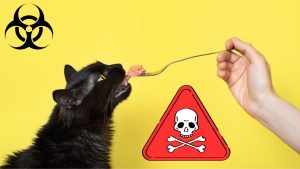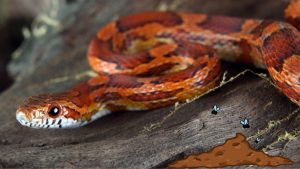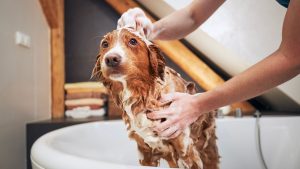If you’re a cat owner, you may have noticed that your furry friend’s nose is dry and cracked. While this may seem like a minor issue, it could be a sign of an underlying health problem. In this article, we’ll explore the causes, symptoms, and treatment options for dry and cracked cat noses, as well as some myths and frequently asked questions about this condition.
There are several potential causes of a dry and cracked cat nose, including dehydration, allergies, and dermatological health conditions. Symptoms of a dry and cracked nose may include flakiness, redness, and irritation. In some cases, the underlying skin may also be affected. Treatment options vary depending on the cause of the condition, but may include hydration, topical ointments, and medication.
Key Takeaways
- A dry and cracked cat nose can be a sign of an underlying health problem.
- Symptoms of a dry and cracked nose may include flakiness, redness, and irritation.
- Treatment options vary depending on the cause of the condition, but may include hydration, topical ointments, and medication.
Causes of Dry and Cracked Cat Nose
A dry and cracked cat nose can be a sign of an underlying health issue. Here are some of the most common causes of dry and cracked cat nose:
Dehydration
Dehydration is one of the most common reasons why a cat’s nose may become dry and cracked. If your cat is not drinking enough water, their nose can become dry and flaky. Encourage your cat to drink more water by providing fresh water in a clean bowl and adding moisture to their food.
Sunburn and Sun Damage
Just like humans, cats can get sunburned. If your cat spends a lot of time in the sun, their nose can become dry and cracked. To prevent sunburn and sun damage, keep your cat indoors during the hottest parts of the day and apply pet-safe sunscreen to their nose and ears if they go outside.
Allergies
Allergies can also cause a cat’s nose to become dry and cracked. Common allergens include pollen, dust, and certain foods. If you suspect that your cat has allergies, take them to the vet for a proper diagnosis and treatment plan.
Upper Respiratory Infections
Upper respiratory infections are another common cause of dry and cracked cat nose. Symptoms of a respiratory infection can include sneezing, coughing, and discharge from the nose and eyes. If you suspect that your cat has an upper respiratory infection, take them to the vet right away.
Autoimmune Diseases
Autoimmune diseases can also cause a cat’s nose to become dry and cracked. These diseases occur when the immune system attacks healthy cells in the body. If you suspect that your cat has an autoimmune disease, take them to the vet for a proper diagnosis and treatment plan.
Trauma
Trauma to the nose, such as a scratch or a bump, can also cause it to become dry and cracked. If your cat has experienced trauma to their nose, take them to the vet for an evaluation.
Fungal Infections
Fungal infections can also cause a cat’s nose to become dry and cracked. These infections are caused by a type of fungus and can be treated with antifungal medication.
Bacterial Infections
Bacterial infections can also cause a cat’s nose to become dry and cracked. These infections are caused by bacteria and can be treated with antibiotics.
Skin Cancers
In rare cases, dry and cracked cat nose can be a sign of skin cancer. If you notice any unusual lumps or bumps on your cat’s nose, take them to the vet for an evaluation.
Remember, a dry and cracked cat nose can be a sign of an underlying health issue. If you notice any changes in your cat’s nose, take them to the vet for an evaluation.
Symptoms of Dry and Cracked Cat Nose
A dry and cracked nose is a common issue among cats. It can be caused by various factors, including dehydration, allergies, infections, and other underlying medical conditions. If you notice that your cat’s nose is dry and cracked, it’s important to observe other symptoms that may indicate discomfort in the nasal area.
Crusty or Scabby Nose
One of the most obvious symptoms of a dry and cracked cat nose is the appearance of crusty or scabby skin on the nose. This can be caused by a variety of factors, including allergies, infections, and sun damage. If you notice that your cat’s nose is crusty or scabby, it’s important to observe other symptoms that may indicate discomfort in the nasal area.
Bleeding or Sores
Another symptom of a dry and cracked cat nose is bleeding or the appearance of sores on the nose. This can be caused by various factors, including allergies, infections, and trauma. If you notice that your cat’s nose is bleeding or has sores, it’s important to seek veterinary attention as soon as possible.
Lesions or Oozing
In some cases, a dry and cracked cat nose may also be accompanied by lesions or oozing. This can be caused by various factors, including infections, allergies, and underlying medical conditions. If you notice that your cat’s nose has lesions or is oozing, it’s important to seek veterinary attention as soon as possible.
Loss of Appetite or Lethargy
A dry and cracked cat nose may also be accompanied by a loss of appetite or lethargy. This can be caused by various factors, including dehydration, infections, and other underlying medical conditions. If you notice that your cat is not eating or seems lethargic, it’s important to seek veterinary attention as soon as possible.
Runny or Discharging Nose
A dry and cracked cat nose may also be accompanied by a runny or discharging nose. This can be caused by various factors, including infections, allergies, and underlying medical conditions. If you notice that your cat’s nose is runny or discharging, it’s important to seek veterinary attention as soon as possible.
Sneezing or Difficulty Breathing
A dry and cracked cat nose may also be accompanied by sneezing or difficulty breathing. This can be caused by various factors, including infections, allergies, and underlying medical conditions. If you notice that your cat is sneezing or having difficulty breathing, it’s important to seek veterinary attention as soon as possible.
Redness or Swelling
A dry and cracked cat nose may also be accompanied by redness or swelling. This can be caused by various factors, including infections, allergies, and underlying medical conditions. If you notice that your cat’s nose is red or swollen, it’s important to seek veterinary attention as soon as possible.
Treatment for Dry and Cracked Cat Nose
If your cat has a dry and cracked nose, there are several treatment options available. The treatment will depend on the underlying cause of the condition. Here are some common treatment options for dry and cracked cat nose:
Hydration
Dehydration is a common cause of dry and cracked cat nose. Therefore, it is essential to ensure that your cat is well hydrated. Offer your cat plenty of fresh water to drink. You can also try giving your cat wet food, which contains more moisture than dry food.
Antibiotics
If your cat’s dry and cracked nose is caused by a bacterial infection, your veterinarian may prescribe antibiotics. Antibiotics can help to clear up the infection and prevent it from spreading to other parts of the body.
Surgery
In some cases, surgery may be necessary to treat a dry and cracked cat nose. For example, if your cat has a nasal tumor or polyps, surgery may be required to remove them. Your veterinarian will discuss the options with you and recommend the best course of action.
Topical Treatments
Topical treatments can help to soothe and moisturize your cat’s dry and cracked nose. Petroleum jelly is a common topical treatment that can help to keep the nose moisturized. Apply a thin layer of petroleum jelly to the nose several times a day.
Immune System Boosters
If your cat’s dry and cracked nose is caused by a weakened immune system, your veterinarian may recommend immune system boosters. These can help to strengthen your cat’s immune system and prevent future infections.
In conclusion, there are several treatment options available for dry and cracked cat nose. The treatment will depend on the underlying cause of the condition. It is essential to consult with your veterinarian to determine the best course of action for your cat.
Prevention of Dry and Cracked Cat Nose
If you want to prevent your cat’s nose from becoming dry and cracked, there are a few things you can do. Here are some tips:
Air Circulation
Make sure your cat’s living space is well-ventilated. Poor air circulation can cause the air to become too dry, which can lead to your cat’s nose becoming dry and cracked. You can use a humidifier to help increase the moisture in the air.
Cat-Safe Sunscreen
If your cat spends a lot of time in the sun, you should consider using a cat-safe sunscreen to protect their nose from becoming dry and cracked. Look for a sunscreen that is specifically designed for cats and does not contain any harmful ingredients.
Water Intake
Make sure your cat is drinking enough water. Dehydration can cause your cat’s nose to become dry and cracked. You can encourage your cat to drink more water by providing them with fresh water daily and using a water fountain.
Overall Health
Make sure your cat is healthy overall. A healthy cat is less likely to develop a dry and cracked nose. Take your cat to the vet regularly for check-ups and make sure they are up-to-date on all of their vaccinations.
Sense of Smell
Your cat’s sense of smell is very important to them. A dry and cracked nose can affect their sense of smell, which can lead to other health problems. Make sure your cat’s nose is always moist and healthy.
By following these tips, you can help prevent your cat’s nose from becoming dry and cracked. Remember that prevention is always better than cure, so it is important to take care of your cat’s nose before it becomes a problem.
When to See a Veterinarian
If your cat’s nose is dry and cracked, it could be a sign of an underlying health issue. While a dry nose is not always a cause for concern, it is important to keep an eye on your cat’s behavior and overall health. Here are some signs that indicate it’s time to see a veterinarian:
- Persistent dryness and cracking: If your cat’s nose remains dry and cracked for an extended period of time, it could be a sign of an underlying health issue. In this case, it’s best to consult a veterinarian to rule out any potential health problems.
- Bleeding or discharge: If your cat’s nose is bleeding or has a discharge, it could be a sign of an infection or injury. In this case, it’s important to take your cat to the vet as soon as possible.
- Changes in behavior: If your cat’s behavior has changed, such as a loss of appetite or lethargy, it could be a sign of an underlying health issue. In this case, it’s best to consult a veterinarian to rule out any potential health problems.
- Other symptoms: If your cat is exhibiting other symptoms, such as coughing, sneezing, or difficulty breathing, it could be a sign of an upper respiratory infection. In this case, it’s important to take your cat to the vet as soon as possible.
In general, if you’re concerned about your cat’s health, it’s always best to consult a veterinarian. A veterinarian can help diagnose any underlying health issues and provide the appropriate treatment. Additionally, regular check-ups with a veterinarian can help ensure your cat stays healthy and happy.
Myths About Dry and Cracked Cat Nose
There are many myths surrounding the topic of dry and cracked cat noses. Some of these myths can lead to unnecessary worry for cat owners. Here are a few common myths about dry and cracked cat noses:
- Myth 1: A dry cat nose is always a sign of illness. This is not true. A cat’s nose can be dry for many reasons, including dehydration, sun exposure, or simply because the cat is sleeping.
- Myth 2: A warm cat nose means the cat is sick. This is also not true. A cat’s nose can be warm for many reasons, including being in a warm environment or just waking up from a nap.
- Myth 3: A cat with a dry nose is not drinking enough water. While dehydration can cause a dry nose, a cat’s hydration status can vary throughout the day. A dry nose alone is not necessarily an indicator of dehydration.
- Myth 4: A cat with a dry nose is more prone to illness. There is no evidence to support this claim. A cat’s nose moisture level does not determine its susceptibility to illness.
It’s important to remember that a cat’s nose can vary in moisture level throughout the day, and a dry nose is not always a cause for concern. However, if you notice other symptoms such as lethargy, loss of appetite, or discharge from the nose or eyes, it’s best to consult with a veterinarian to rule out any underlying health issues.
Frequently Asked Questions
What can cause a cat’s nose to become dry and cracked?
A cat’s nose can become dry and cracked due to various reasons, including dehydration, exposure to dry air, sunburn, allergies, infections, and certain medical conditions. Some cats may also have naturally dry noses, which is not a cause for concern.
How can I treat my cat’s dry and cracked nose?
One of the most effective ways to treat a cat’s dry and cracked nose is to keep them hydrated by providing plenty of fresh water and wet food. You can also use a humidifier to increase the moisture in the air, apply a small amount of petroleum jelly or coconut oil to the nose, and ensure that your cat is not exposed to direct sunlight for extended periods.
Can a cat’s dry nose be a sign of illness?
Yes, a cat’s dry nose can be a sign of illness, especially if it is accompanied by other symptoms such as sneezing, coughing, lethargy, loss of appetite, or discharge from the nose or eyes. Some of the medical conditions that can cause a dry nose in cats include feline herpesvirus, calicivirus, and immune-mediated diseases.
What are some home remedies for a cat’s dry nose?
Some home remedies for a cat’s dry nose include applying a small amount of petroleum jelly or coconut oil to the nose, using a humidifier to increase the moisture in the air, and providing plenty of fresh water and wet food.
Is it safe to use coconut oil on my cat’s dry nose?
Yes, it is safe to use coconut oil on your cat’s dry nose, as long as you use a small amount and don’t let your cat ingest it. Coconut oil has natural moisturizing properties and can help soothe and heal a dry and cracked nose.
When should I take my cat to the vet for a dry nose?
You should take your cat to the vet for a dry nose if it is accompanied by other symptoms such as sneezing, coughing, lethargy, loss of appetite, or discharge from the nose or eyes. Additionally, if your cat’s nose is severely dry, cracked, bleeding, or scabbed, it may require medical attention.
A cat’s nose can become dry and cracked due to various reasons, including dehydration, exposure to dry air, sunburn, allergies, infections, and certain medical conditions. Some cats may also have naturally dry noses, which is not a cause for concern.
“}},{“@type”:”Question”,”name”:”How can I treat my cat’s dry and cracked nose?”,”acceptedAnswer”:{“@type”:”Answer”,”text”:”
One of the most effective ways to treat a cat’s dry and cracked nose is to keep them hydrated by providing plenty of fresh water and wet food. You can also use a humidifier to increase the moisture in the air, apply a small amount of petroleum jelly or coconut oil to the nose, and ensure that your cat is not exposed to direct sunlight for extended periods.
“}},{“@type”:”Question”,”name”:”Can a cat’s dry nose be a sign of illness?”,”acceptedAnswer”:{“@type”:”Answer”,”text”:”
Yes, a cat’s dry nose can be a sign of illness, especially if it is accompanied by other symptoms such as sneezing, coughing, lethargy, loss of appetite, or discharge from the nose or eyes. Some of the medical conditions that can cause a dry nose in cats include feline herpesvirus, calicivirus, and immune-mediated diseases.
“}},{“@type”:”Question”,”name”:”What are some home remedies for a cat’s dry nose?”,”acceptedAnswer”:{“@type”:”Answer”,”text”:”
Some home remedies for a cat’s dry nose include applying a small amount of petroleum jelly or coconut oil to the nose, using a humidifier to increase the moisture in the air, and providing plenty of fresh water and wet food.
“}},{“@type”:”Question”,”name”:”Is it safe to use coconut oil on my cat’s dry nose?”,”acceptedAnswer”:{“@type”:”Answer”,”text”:”
Yes, it is safe to use coconut oil on your cat’s dry nose, as long as you use a small amount and don’t let your cat ingest it. Coconut oil has natural moisturizing properties and can help soothe and heal a dry and cracked nose.
“}},{“@type”:”Question”,”name”:”When should I take my cat to the vet for a dry nose?”,”acceptedAnswer”:{“@type”:”Answer”,”text”:”
You should take your cat to the vet for a dry nose if it is accompanied by other symptoms such as sneezing, coughing, lethargy, loss of appetite, or discharge from the nose or eyes. Additionally, if your cat’s nose is severely dry, cracked, bleeding, or scabbed, it may require medical attention.
“}}]}
Author
-

Lawrence, the founder of Pet Ploy, established the website in mid-2023. With a lifelong love for pets, Lawrence has been surrounded by a variety of animals since his early years. From dogs and cats to guinea pigs, rabbits, fish, and more, he has experienced the joy of caring for a diverse range of pets. Drawing from his deep-rooted passion, Lawrence created Pet Ploy to share his knowledge and enthusiasm with fellow pet enthusiasts. Through the platform, he aims to provide valuable insights, tips, and resources to promote the well-being and happiness of pets everywhere.











